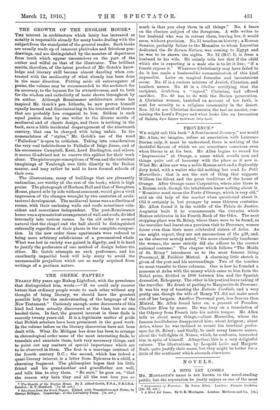THE GREEK PAPYRI.t
NEARLY fifty years ago Bishop Lightfoot, with the prescience that distinguished him, wrote :—" If we could only recover letters that ordinary people wrote to each other without any thought of being literary, we should have the greatest possible help for the understanding of the language of the New Testament." Curiously enough, some documents of this kind had been actually discovered at the time, but no one heeded them. In fact, the general interest in these finds is scarcely twenty years old. It is a legitimate matter of pride that British scholars have been prominent in the good work. In the volume before us the literary discoveries have not been dealt with. What Dr. Milligan has done has been to arrange in chronological order some of the most interesting finds, to translate and annotate them, both very necessary things, and to point out any matters of special importance which are to be observed in them. The first is a marriage contract of the fourth century B.C. ; the second, which has indeed a quasi-literary interest, is a letter from Epicurus to a child, a charming fragment. The philosopher hopes that his little friend and his grandmother and grandfather are well, and tells him to obey them. " Be sure," he goes on, " that the reason why both they and all the rest love you so • The Growth of the English House. By J. Alfred Gotch, F.S.A., F.B.LE.A. London : B. T. Batsford. [7s. 6d. net.] t Selections from the Greek Papyri. Edited, with Translations and Notes, by George Milligan. Cambridge : at the University Press. [5s. net.] much is that you obey them in all things." No. 4 bears on the obscure subject of the Serapeum. A wife writes to her husband who was in retreat there, leaving her, it would seem, without provision. No.11 touches on history ; a Roman Senator, probably father to the Memnius to whom Lucretius dedicated the De Rerum. Natures, was coming to Egypt and he was to be shown the sights. No. 12 (B.C. 1) is from a husband to his wife. He calmly tells her that if the child which she is expecting is a male she is to let it live ; "if a female expose it." Whatever Christianity may have failed to do, it has made a businesslike communication of this kind impossible. Later on magical formulas and incantations occur. No. 47 is a curious mixture of Jewish, Christian, and heathen names. No. 48 is a libellus certifying that the recipient, doubtless a " lapsed" Christian, had offered sacrifice. No. 49 has to do with the Decian persecution. A Christian woman, banished on account of her faith, is sent for security to a religious community in the desert. Nos. 52-54 are Christian documents, the last an amulet, con- taining the Lord's Prayer and what looks like an Invocation of Saints, 'ciyis l‘pnve rfuScrrEcre inr43














































 Previous page
Previous page